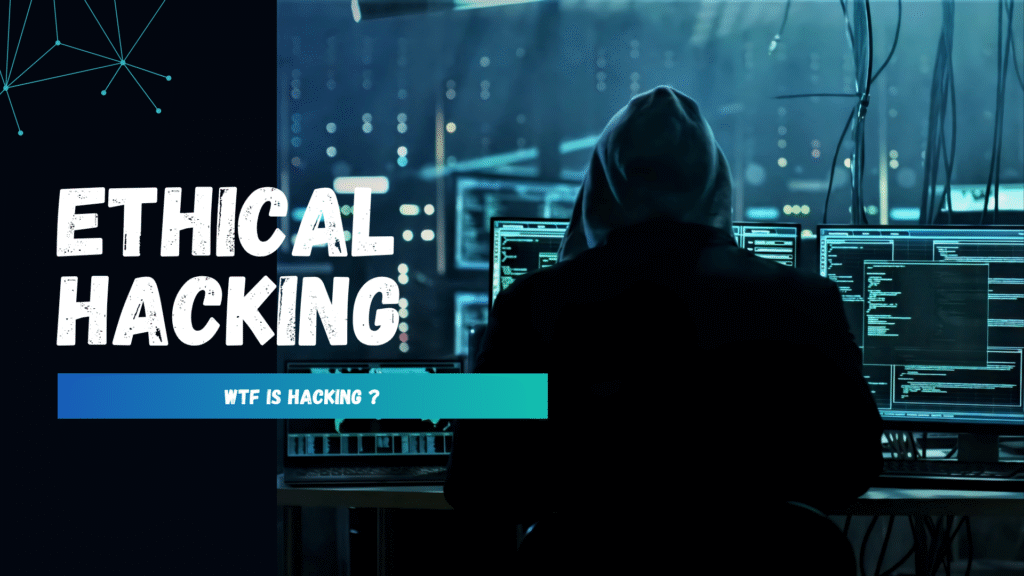WTF Is Hacking?
Okay. So let’s just get this outta the way:
I used to think hacking was just some shady dude in a hoodie typing really fast in green code while EDM plays in the background.
Yup. Thanks, Hollywood.
But real hacking? It’s actually… kinda fascinating. And terrifying. And powerful. And — hear me out — actually not evil by default.
🤯 Wait… hacking isn’t always bad?
Nope. That’s the first lie I had to unlearn.
I literally thought “hacker” meant cyber criminal. Like, steal-your-credit-card-and-send-a-virus bad.
But turns out, hacking is more like a superpower.
It just depends on how you use it.
Kinda like fire. Or memes. Or your browser history.
Here’s the messy truth:
Hacking just means figuring out how to manipulate or break into systems — digital ones, mostly. Sometimes for good. Sometimes for chaos. Sometimes just ‘cause… curiosity.
And sometimes, just for the flex.
(Yes, hackers are dramatic like that.)
💻 My First Real Encounter with Hacking (And Yes, I Freaked Out)
So, one night, I’m watching a basic cybersecurity lecture (don’t judge me, I was bored), and this guy explains how SQL Injection works.
And I was like: “Wait… you can literally just type some weird symbols into a login box and get admin access?”
Bro. I paused the video.
I stared at my bank app.
I spiraled.
I realized how fragile all this tech stuff is. And also, how freaking smart hackers are.
But also — it made me want to learn more.
Because if there are people who can break it, there are people who can protect it too. (That’s the part I never got taught in school.)
🕵️♂️ There Are “Good” Hackers Too. For Real.
This blew my mind:
Not all hackers are evil basement goblins. Some are like… cyber bodyguards.
Let’s break it down like gossip:
- Black Hat Hackers = the villains. Break into stuff. Steal info. Mess up systems. Pure chaos.
- White Hat Hackers = the heroes. Find vulnerabilities before the bad guys do. Help fix them.
- Grey Hat Hackers = messy middle. Sometimes they break rules to do good things. Sometimes they just vibe in the morally blurry area.
I know — sounds like Hogwarts houses but for nerds with laptops.
But it’s important.
Because next time you hear “ethical hacking,” just know it’s not a scam — it’s literally people getting paid to hack into systems legally to make them safer.
Yep. There are bug bounty programs where companies PAY you to break their stuff. Wild, right?
🤔 So How Does Hacking Even Work?
Okay, deep breath. This is where I used to zone out.
Too many terms. Too many protocols. Too much alphabet soup.
But let me give you the “I just had chai and I’m feeling chaotic” version:
- Reconnaissance (aka digital stalking): Hackers gather info about the target. Like a creepy ex but with more code.
- Scanning: They look for open ports, weaknesses, outdated software, bad passwords. Basically poke around until something cracks.
- Access: If they find a way in? Boom. They exploit it. Could be a bug. Could be a stupid default password. Could be someone clicked a shady email.
- Privilege Escalation: This is the “let me go from janitor access to CEO in 3 clicks” part.
- Covering Tracks: The smart ones don’t leave footprints. They erase logs, hide malware, vanish like digital ghosts.
It’s like breaking into a house… and then rearranging the furniture so it looks cleaner than before.
🔐 Why You Should Care (Even If You’re Not a Techie)
Look — I know. You’re not trying to become the next Anonymous.
You just wanna watch Netflix and not get hacked.
But that’s the point.
You don’t need to be a hacker to respect how hacking works.
Because once you understand it — even just the basics — you start seeing patterns. You stop clicking sketchy links. You start asking better questions.
I used to reuse the same password for like, 9 websites. I literally had “password123” on my college portal. I was a walking target.
Now? I use a password manager. I don’t trust public WiFi. I side-eye every weird pop-up. Paranoia? Maybe. But smart paranoia.
🧠 TL;DR (but not really)
Hacking isn’t just some elite, Hollywood thing.
It’s not always criminal. It’s not always cool.
But it’s always powerful.
And the more you understand it, the more you realize:
The internet isn’t a safe place by default. It becomes safer when more people know how it can be broken.
That includes you. Even if you’re not a “tech person.”
(Which btw, is a fake term. If you use a phone, you’re already tech-ish.)
Final Thought (Before My Brain Melts)
If you’ve ever felt too dumb for this topic — same.
If you’ve ever thought hacking was just “bad guys doing bad stuff” — same.
If you made it this far and learned anything — high five. You just leveled up.
Anyway. My Spotify just shuffled to “Blinding Lights,” and I think that’s my cue to stop typing.
Go Google SQL Injection. Just for fun.
(Not to use it. I see you.)
Stay curious. Stay safe. Don’t use ‘123456’ as your password.
✌️
Want another late-night brain dump on tech, AI, or anything weirdly deep?
Ping me. I’m probably still sipping chai.
Bonus books for you : Hacker’s Handbook
If you have any kind of problem feel free to contact us : Contact us



